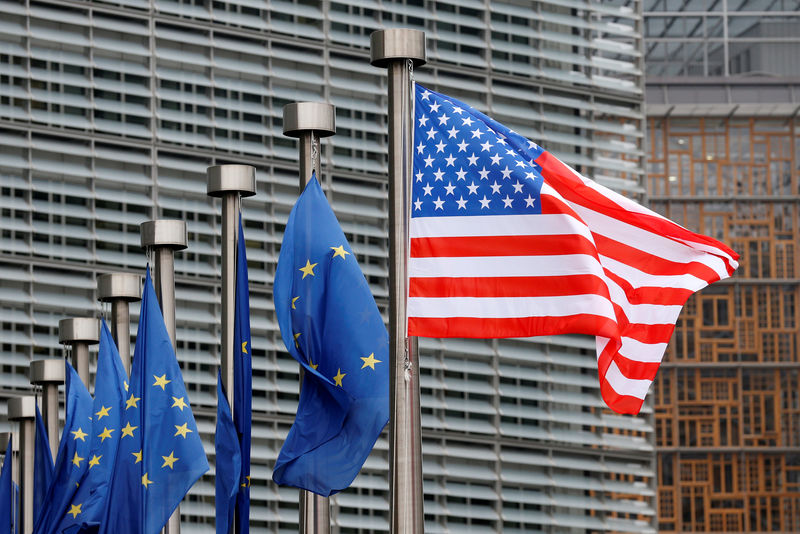By Philip Blenkinsop
BRUSSELS (Reuters) - Europe's claim to be the global champion of open trade and a counterweight to the threatened protectionism of U.S. President Donald Trump risks ringing hollow if it cannot sign a new Pacific free trade deal by the end of 2017.
As part of the process, the European Union needs to persuade an EU public wary of globalisation that it will profit from more trade. This has led it to demand more from would-be partners, increasing the risk of failure or delay.
For the past three years, the EU's trade agenda has been dominated by Transatlantic Trade and Investment Partnership (TTIP) talks with the United States. Following the U.S. election, they are "frozen".
EU trade chief Cecilia Malmstrom said in a March speech, however, that TTIP was not the only game in town.
"As other doors are closing, we should be clear to them (trade partners) that ours will remain open," she said.
With the twin shock of Trump's election and Britain's vote to leave the European Union, Malmstrom has said there has never been a more important time to defend openness.
Yet it is unclear if the EU's vow to "shape" the economic order with open trade deals will convince sceptical Europeans and limit the appeal of politicians such as French presidential candidate Marine Le Pen who decries "rampant globalisation".
For the EU as a whole, this year could prove a crucial one after early, albeit difficult, success of the EU-Canada Comprehensive Economic and Trade Agreement (CETA).
Sorin Moisa, a centre-left member of the European Parliament who helped steer CETA through and is now the parliament's point person for a potential EU-Mexico deal, said the EU should move beyond CETA.
"We should have at least another major achievement and we also need to take a major step in terms of our response to globalisation against the double backdrop of Trump and Brexit," he said.
END OF YEAR TARGETS
Since the freezing of TTIP, many of the 200 or so officials focussed on it have since been rechannelled to the EU's three major new targets -- Japan, Mexico and the Mercosur bloc of Argentina, Brazil, Paraguay and Uruguay. For both Japan and Mexico, the goal is to conclude trade talks by the end of 2017.
The promise is growth and jobs. In the case of Japan, an ambitious deal could boost EU GDP by between 100 and 319 billion euros. With a Mercosur deal, the EU would have privileged access compared with competitors outside Latin America, such as to public tenders worth up to 150 billion euros in Brazil alone.
Japan, smarting from Trump's decision to withdraw the United States from the 12-nation Trans-Pacific Partnership, may be the brightest prospect. However, some EU officials wonder whether the talks, which has already seen 2015 and 2016 deadlines come and go, will ever conclude if they cannot this year.
The Trump trade void may also not last forever.
"Japan will start the (bilateral) negotiations as early as this summer with the U.S. -– and given its strategic importance, the U.S. negotiations will be prioritised," said Hosuk Lee-Makiyama, director of trade think tank ECIPE.
An EU-Mexico trade deal this year could also prove a stretch. One EU official described the target as possible but "challenging".
SCEPTICAL PUBLIC
The European Union also has internal issues.
Brexit negotiations, set to begin in the coming weeks, could prove a distraction and exhaust resources and political capital, with EU-UK trade talks possible from 2018. Brexit also deprives the EU of one of its most outspoken free trade advocates.
Above all, the EU itself needs to sell free trade to a sceptical public after battles over TTIP and CETA, which critics across the continent argued were stacked in favour of multinationals and risked letting in "Frankenstein food".
Neither Japan nor Mexico nor Mercosur have ignited similar passions, although France and farming groups have expressed concern about the surge of beef imports that the Mercosur foursome could bring.
The lesson from the TTIP and CETA battles is that the EU needs to go beyond plain economic arguments and stress fair as much as free trade, with EU values on environmental and labour standards also included, including commitments to sustainability or to International Labour Organization standards.
Another item, the EU will have to include will be its answer to the contentious issue of investment protection, with independent courts rather than arbitration panels to settle disputes between foreign investors and countries.
Canada and Vietnam have signed up to the idea, but other would-be partners have their doubts.
"This is a major question mark," said Paul Kerneis, managing director of the European Services Forum that represents the trade interests of the EU's services sector. "For the future of EU trade agreements, investor protection is going to be the key."
For graphic on EU trade click on http://tmsnrt.rs/2q71iyk
